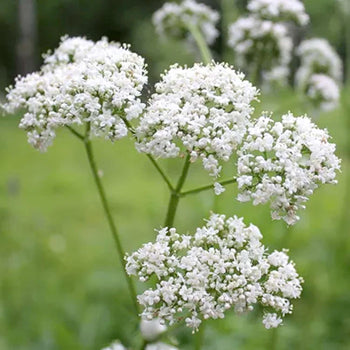
Season: Spring - Fall
Looking for a Specific Herb?
Search Our Herb Almanac Below:
|
|
|
Valerian is a perennial herb native to Europe and Asia. Its root has been used for centuries as a natural remedy for a variety of health conditions, including insomnia, anxiety, and digestive problems. The active compounds in valerian root are believed to have a calming effect on the body and mind, helping to reduce anxiety, stress, and promote relaxation.
Valerian is commonly available in supplement form, including capsules, tablets, and teas, but it can also be found in essential oil form. While valerian is generally considered safe, it is important to speak with a healthcare provider before using it, as it can interact with certain medications. Additionally, some people may experience side effects, such as headache, dizziness, and dry mouth.
|
 |

Mature Height
24 Inches |
 |

Mature Width
24 Inches |
 |

Light
Half Sun |
 |

Water
Moderate |
 |
|
Uses
Valerian is a popular herbal supplement commonly used for its calming and relaxing effects. It is often used to treat insomnia, anxiety, stress, and tension headaches. It is also used for digestive problems such as bloating, gas, and indigestion. In addition, valerian has been traditionally used as a natural remedy for menstrual cramps, joint pain, and restless leg syndrome.
The active compounds in valerian root are believed to interact with the central nervous system to promote relaxation and reduce anxiety. Valerian supplements are available in various forms, including capsules, tablets, teas, and tinctures.
It is important to speak with a healthcare provider before using valerian, as it may interact with certain medications and cause side effects in some people.
|
 |
|
RECIPES
Valerian Tea
Ingredients:
* 1 tablespoon of dried valerian root
* 8 ounces of boiling water
* Honey or lemon (optional)
Instructions:
Place the dried valerian root in a heatproof mug.
Pour the boiling water over the root.
Let it steep for 5-10 minutes.
Strain the tea into a cup, discarding the solids.
Sweeten with honey or lemon, if desired.
Enjoy your cup of valerian tea while it's still warm.
This simple valerian tea is a great way to unwind after a long day and enjoy the calming benefits of this popular herb. Enjoy your tea, and relax!
|
|






















